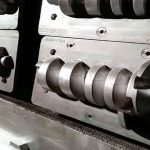The SPE (American Plastics Engineering Association) Global Plastics Environmental Conference (GlobalPlasticsEnviromentalConference) held in Detroit, USA provided some new development results, including new additives to improve the resin grade of recycled PET bottles. The new additive introduced at the SPE conference is the reactive series of additives CESA-Extend of Clariant Masterbatch Company, which is used to branch the PET molecule and improve the recovery of PET without the need for solid phase reaction in the reactor. Intrinsic viscosity, after adding CESA-Extend chain extender, the molecular weight of PET rose to the equivalent molecular weight of the new PET resin without reducing mechanical properties, thermal properties and crystallinity. In addition, CESA-Extend is easy to use. Generally, PET chain extension needs to be heated and pre-dried for several hours under high vacuum. Sometimes the branching reaction cannot be controlled to produce gel. Now, CESA-Extend is added through a twin-screw extruder. There is no need to pre-dry under high vacuum, only a small amount of gel is produced.
Another function and advantage of Clariant’s new chain extender is to improve the compatibility of recycled PET with other polyesters, polycarbonates and nylons. Functional acrylic oligomer. The company and Clariant jointly own the technical patent of the product. According to reports, CESA-Extend can undergo polycondensation reactions with polycarbonate, nylon, polyoxymethylene, thermoplastic polyurethane, PBT and the above polymer blends, but it is the most effective for PET and the worst for nylon. The reactive groups include amide groups, isocyanate groups, carboxylate groups, and hydroxyl groups.
CESA-Extond improves the melt strength of recycled PET resin, which is enough to meet the requirements of PET extrusion blow molding (bottle) and even extrusion blown film process. The undried recycled PET with an intrinsic viscosity of 0.75 is reacted with 3 A-Extend. After exiting, the intrinsic viscosity rose to 0.78, and under the same conditions of no vacuum and the same starting resin and extrusion process, the intrinsic viscosity of the recycled PET without chain extender dropped to 0.543. The intrinsic viscosity of 0.558 recycled PET plus 2x A-Extend is extruded by a twin-screw machine and the intrinsic viscosity is increased to 0.673. If 3% chain extender is added, it can be increased to 0.720.
mold Wiki provides you with the most comprehensive plastic, plastic, mold, mold design, decoration knowledge points of plastic mold brands, and shopping guide and online shopping services for various plastic molds, with the cheapest plastic mold prices and the best quality after-sales service. Please visit Mold Wiki: https://mold.wiki/Keywords of the article: mold design; products related to mold design:
Link to this article:Introduction of new method knowledge that can improve the grade of recycled PET plastic
Reprint Statement: If there are no special instructions, all articles on this site are original. Please indicate the source for reprinting:Mold Wiki,Thanks!^^

